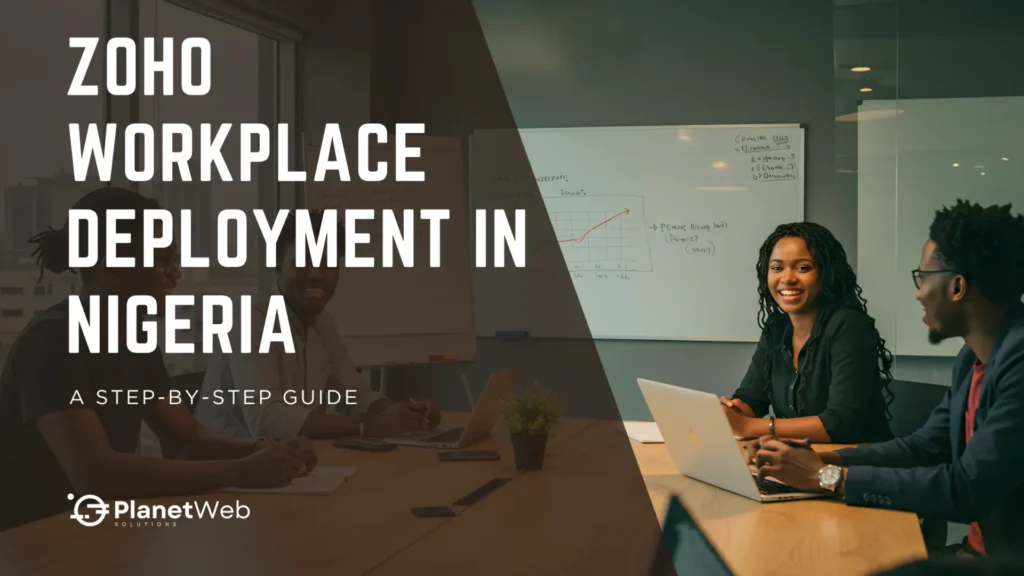Mastering Zoho Workplace Deployment in Nigeria: Practical Steps for a Smooth Rollout
Introduction: The Fragmented Office Problem
Your sales team lives in WhatsApp groups. HR sends important updates through Gmail. The finance team shares spreadsheets on Google Drive. And everyone scrambles to remember which Zoom link to use for the Monday meeting. Four apps. Four subscriptions. Four places where important information gets lost.
This is more than annoying. Every app switch costs time. Every duplicate file creates confusion. And when your naira budget has to cover dollar subscriptions across multiple platforms, the cost adds up fast.
Zoho Workplace changes this. It’s a single suite that handles email, file storage, team chat, video meetings, and office documents. One login. One bill. One place for your team to work.
This guide walks Nigerian businesses through Zoho Workplace Deployment in Nigeria — from planning to go-live. Whether you’re a 10-person startup in Lagos or a 200-person company in Abuja, you’ll find clear steps, realistic timelines, and solutions tailored to local challenges.
For a broader overview of Zoho Workplace and how it supports Nigerian companies, see Zoho Workplace in Nigeria.
Why Zoho Workplace Fits Nigerian Businesses
The shift to Zoho Workplace isn’t happening by accident. Nigerian businesses are dealing with specific pressures that make the traditional Google and Microsoft routes harder to justify.
Cost Predictability in a Volatile FX Market
Google Workspace and Microsoft 365 bill in dollars. When the naira weakens, your office software budget can jump 20% overnight. Zoho Workplace also bills in USD, but the pricing structure is different. A Standard plan costs approximately $3 per user per month, and a Professional plan costs $6. Compare that to Google Workspace’s $6–$ 12 range or Microsoft 365’s $6–$ 22 spread. For a 30-person company, choosing Zoho Standard over Google Business Starter results in an annual savings of approximately $1,080.
Built-in NDPA 2023 Compliance Controls
The Nigeria Data Protection Act of 2023 requires businesses to handle customer and employee data responsibly. Zoho’s data processing agreements and privacy controls align with the requirements of the NDPA. You get audit trails, data retention settings, and user access controls built into the admin console. For sectors such as banking, insurance, or healthcare that face increased scrutiny, this compliance foundation is crucial.
Learn more about how compliance works across industries in Zoho Workplace for Legal Firms and Zoho Workplace for Oil and Gas.
Everything in One Place
Zoho Workplace includes business email, cloud storage, team chat, video conferencing, and office document editors. No more stitching together apps from different vendors. No more explaining to new hires why they need seven different passwords.
At a glance: how Zoho compares to the global alternatives Nigerian companies use:
| Feature | Zoho Workplace | Google Workspace | Microsoft 365 |
|---|---|---|---|
| Starting price/user/month | $3 (Standard) | $6 (Business Starter) | $6 (Business Basic) |
| Email + storage | ✓ | ✓ | ✓ |
| Office apps | ✓ | ✓ | ✓ |
| Team chat | ✓ (Cliq) | ✓ (Chat) | ✓ (Teams) |
| Video meetings | ✓ (Meeting) | ✓ (Meet) | ✓ (Teams) |
| NDPA-ready controls | ✓ | Requires configuration | Requires configuration |
Pre-Deployment Planning
Most deployment issues start with rushed planning. Two or three days of proper preparation prevent weeks of cleanup later.
Define Your Structure
List every person who needs an account and categorize them into the following groups: executives, sales, operations, support, and contractors. Decide which apps each group actually needs. Not everyone requires Meeting licenses if they rarely join video calls.
Verify Domain Access
You’ll need access to your domain’s DNS settings. If your domain is yourcompany.com.ng or yourcompany.ng, make sure you can log into your registrar account. Common Nigerian registrars include Web4Africa, Whogohost, and Qservers. If your domain is managed by an old vendor and you can’t access the account, sort that out now.
Check Compliance Requirements
Banking, oil and gas, and healthcare sectors have specific data handling rules beyond basic NDPA requirements. Review what applies to your industry and confirm with your compliance officer.
Take Migration Inventory
Write down how many email accounts you’re moving, approximate mailbox sizes, critical shared drives, and contact lists that matter. This inventory tells you whether you’re looking at a weekend migration or a two-week project.
Choose Your Licensing
Standard ($3/user/month): Email, 30GB storage, basic apps. Good for small teams under 25.
Professional ($6/user/month): 100GB storage, eDiscovery, advanced admin tools, and integrations. This is the sweet spot for most Nigerian SMEs.
Budget in USD but track against your naira position. Set aside a 15–20% buffer for FX movement if you’re planning an annual payment.
Not sure which tier fits your needs? PlanetWeb’s readiness assessment helps you right-size your licensing from day one, so you’re not overpaying or buying something that won’t scale.
You can explore our full service offering at Zoho Workplace Solutions.
Zoho Workplace Deployment in Nigeria: What Actually Happens
Here’s what a realistic Step-by-Step Zoho Workplace Deployment in Nigeria looks like for a Nigerian SME with 30–50 users. Larger companies can stretch this timeline; smaller teams can compress it.
Week 1: Foundation Setup
Domain and DNS (Days 1–2): Add your domain in Zoho’s admin console and configure MX, SPF, DKIM, and DMARC records. DNS propagation across Nigerian networks typically takes 6–24 hours. Test with a few pilot accounts before switching all mail traffic.
User Creation (Day 3): Upload users via CSV for teams of 10 or more people. Create functional email addresses, such as sales@, support@, and info@, so that inquiries reach the right teams.
Email Migration Starts (Days 4–5): Use Zoho’s built-in IMAP migration tool to pull mail from Gmail, Outlook, or other providers. Start with pilot users, test thoroughly, then expand to everyone. Coordinate the cutover for a Friday evening or weekend to minimize disruption.
If you’re migrating from Gmail or Outlook, our detailed Zoho Mail Setup Guide and How to Migrate to Zoho Mail provide step-by-step help.
Week 2: Collaboration and Security
Files and Chat (Days 6–7): Structure WorkDrive teams and folders by department. Set up Cliq channels to replace WhatsApp chaos. Enable Zoho Meeting for video calls.
For file storage comparisons and use cases, see Zoho WorkDrive vs Google Drive in Nigeria and Zoho WorkDrive for Nigerian SMEs.
Security Configuration (Day 8): Turn on multi-factor authentication, set password policies, configure data retention for NDPA compliance, and enable audit logging.
Week 3–4: Testing and Rollout
Pilot Department (Week 3): Give one friendly department full access for 5–7 days. Marketing or IT work well. Watch for login problems, confusion, or missing features. Fix issues as they come up.
Training and Go-Live (Week 4): Record a 15-minute training video, create a one-page cheat sheet, and schedule company-wide training three days before go-live. Have IT or your Zoho partner available all day for troubleshooting.
✅ Realistic Timeline: About 3–4 weeks from decision to full operation for most SMEs. Larger companies (with 100+ users) may extend this to 6 weeks. Smaller teams (under 20 users) can compress it to 10 days.
Making It Work in Nigeria: Handling Local Challenges
Generic deployment guides miss the realities Nigerian businesses face. Here’s how to handle them.
Connectivity Issues
Enable offline access in WorkDrive so users can mark important files for offline use. Use Cliq’s lightweight mobile app when office Wi-Fi goes down. Schedule large uploads for off-peak hours. Zoho Mail’s desktop app caches emails locally, allowing users to work offline.
Zoho Workplace also supports remote and hybrid setups; see Remote Work with Zoho Workplace in Nigeria for best practices.
DNS Propagation Delays
🔧 Local DNS Tip: Nigerian registrars sometimes default to high TTL settings, which slows DNS propagation. Lower TTL to 3600 seconds (1 hour) before making changes. Test with MXToolbox to confirm records are active. If 48 hours pass without updates, contact your registrar directly.
Legacy Data Cleanup
Don’t migrate everything. Archive mail older than 3 years to the local backup, but don’t import it into Zoho. Delete test accounts. Standardize naming conventions. Stage migrations in batches of 10–20 users to isolate problems quickly.
User Adoption
Appoint internal champions in each department who answer questions and push colleagues to use new tools. Make Zoho easier than the old way with bookmarks and mobile apps. After two weeks, stop forwarding mail from the old system. People adapt fast when they have no choice.
This is where many deployments fail. Technical setup is straightforward. Getting your team to actually use Zoho requires change management, training, and ongoing support. If you partner with an experienced Zoho VAR, such as PlanetWeb, adoption planning is typically built into the rollout to help your team settle in more quickly.
Also see: Zoho Workplace Deployment Mistakes
When to Handle Deployment Yourself vs. Working with Experts
You can deploy Zoho Workplace yourself if:
- Your team is under 20 users
- You have in-house IT capacity
- Your migration is simple (basic email, minimal legacy data)
- You have time to troubleshoot DNS, migration, and adoption issues
Consider working with a Zoho partner if:
- You’re migrating 50+ users or complex data
- You lack IT staff or DNS expertise
- You’re in a regulated sector with strict compliance requirements
- You need it done right the first time without trial and error
- You want user training and adoption support included
As a Zoho Value Added Reseller in Nigeria, PlanetWeb understands the local deployment challenges. We know which Nigerian registrars have quirks, how to stage migrations around connectivity issues, and how to get your team actually using the platform after technical setup is complete.
A typical deployment service includes:
- Pre-deployment readiness assessment
- Complete technical setup (domain, DNS, users, security)
- Email and file migration with minimal downtime
- User training tailored to Nigerian work styles
- Post-deployment support for 30 days
Pricing Transparency: What Deployment Actually Costs
Zoho Licensing (paid to Zoho):
- Standard: $3/user/month
- Professional: $6/user/month
Deployment Services (if working with PlanetWeb):
- Small deployment (10–25 users): Fixed fee
- Medium deployment (26–75 users): Tiered pricing
- Enterprise deployment (76+ users): Custom quote
Deployment services vary based on team size, migration complexity, and support needs. Compare that to the cost of downtime or data loss from a mismanaged setup. Prevention almost always costs less.
Request a custom quote based on your specific situation. We’ll also show you the three-year total cost of ownership compared to Google Workspace and Microsoft 365.
You can also explore how Zoho fits into broader startup ecosystems in Zoho Apps for Nigerian Startups and Zoho One for Nigerian Startups.
Frequently Asked Questions (FAQ)
Below are quick answers to some of the most frequently asked questions by Nigerian businesses about Zoho Workplace Deployment in Nigeria. These address timelines, migration, compliance, and cost to help you plan your deployment more confidently.
Next Steps
Ready to Deploy?
Option 1: DIY Deployment
Download our free deployment checklist and set up your system yourself. The checklist covers every technical step in this guide.
Option 2: Guided Deployment
Book a 30-minute consultation with PlanetWeb. We’ll assess your situation, recommend the right licensing tier, and provide a fixed-price deployment quote. No obligation.
Option 3: Full-Service Deployment
Request a proposal for complete deployment services. We handle everything from DNS to user training, allowing you to focus on running your business.
Useful Resources
- Zoho Workplace Documentation: workplace.zoho.com/help
- NDPA 2023 Guidelines: ndpc.gov.ng
- PlanetWeb Case Studies: See how other Nigerian businesses deployed Zoho Workplace here
Deploying Zoho Workplace is not rocket science, but it does require planning, technical expertise, and realistic expectations. Whether you handle it yourself or work with a partner like PlanetWeb, the goal is the same: a functional, secure, NDPA-compliant workspace that your team actually uses. With the right approach to Zoho Workplace Deployment in Nigeria, your business gains a secure, collaborative environment built for productivity. Get it right, and you’ll stop juggling five different apps just to send a file and schedule a meeting.






